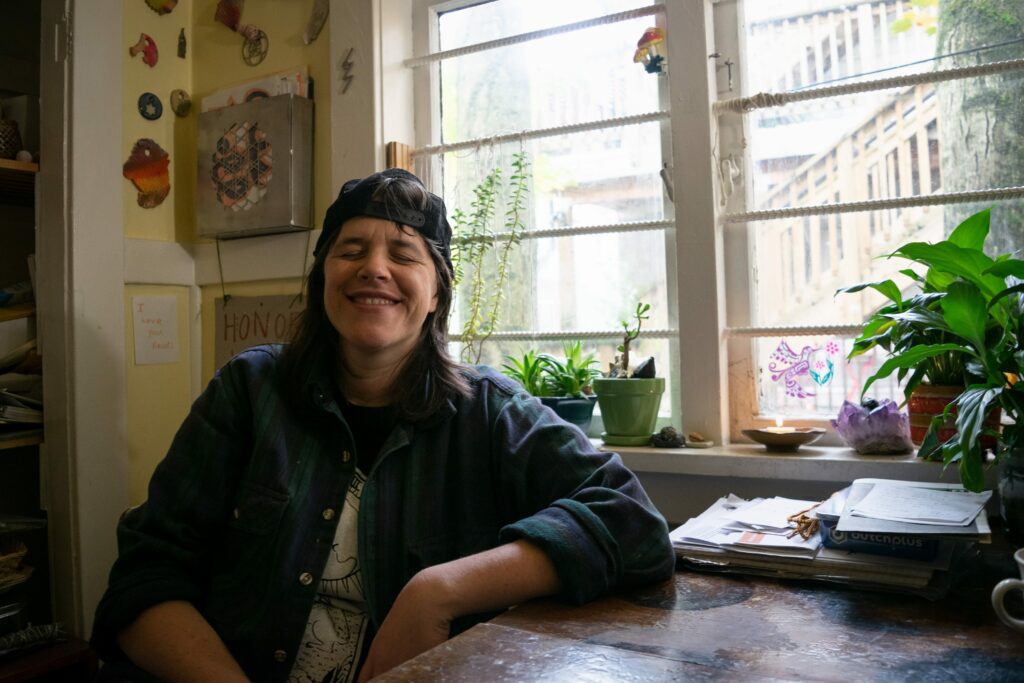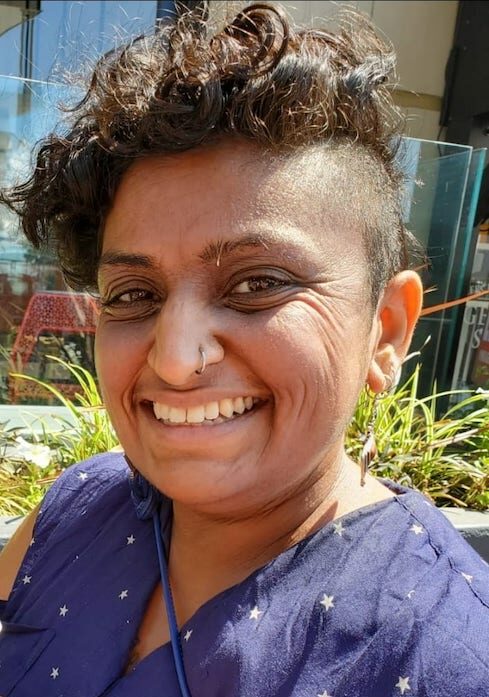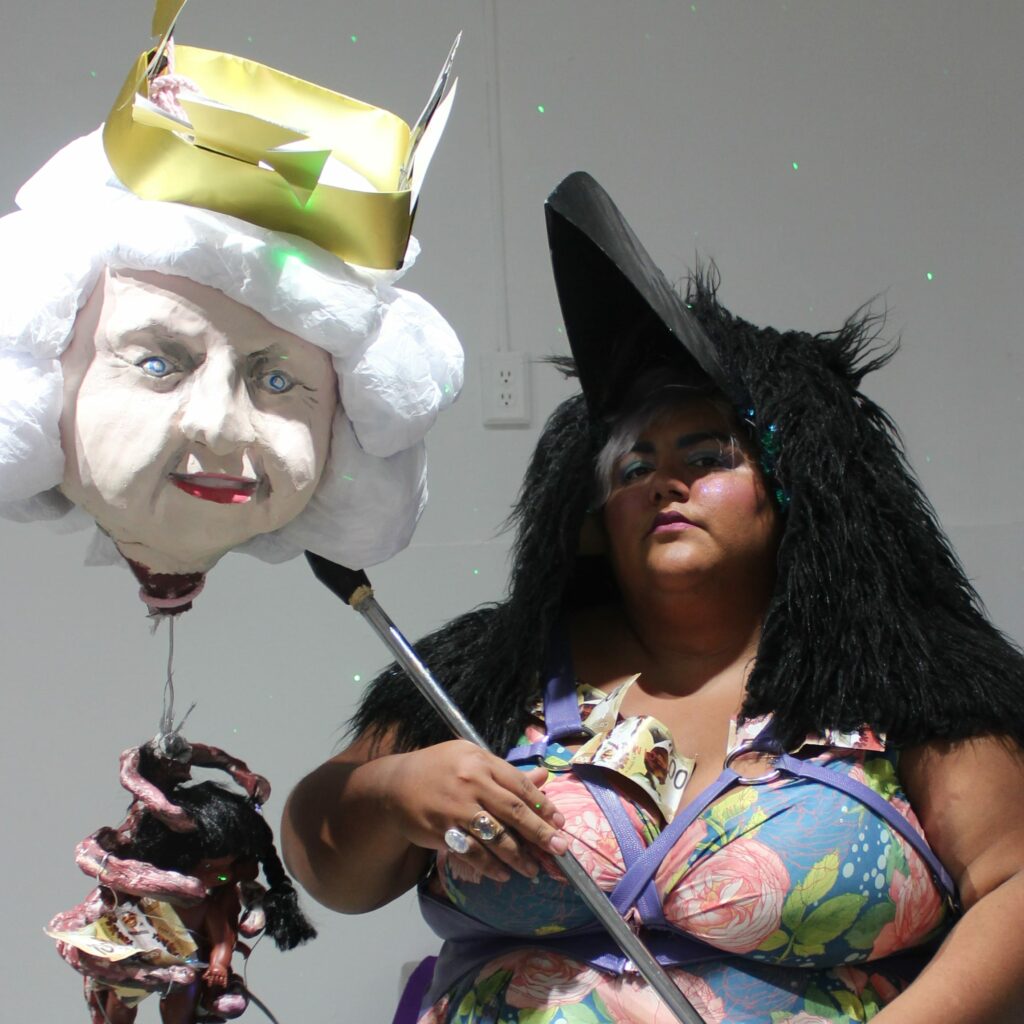Haisla Collins
Haisla Collins was born and raised in Vancouver BC and has mostly Tsimshian, Nisga’a, Gitxsan, and mixed European ancestry. She has a Bachelor of Fine arts from Emily Carr University, 6 years of singing lessons and performance coaching with legendary jazz singer Ron Small, and a year of social sciences from Langara College. In 2019 Haisla won an alumni award from Langara college for community building in the arts.
Haisla’s work is magical and full of patterns and colours, she takes an expressionist approach to North West Coast forms and design and puts an emphasis on indigenous storytelling and cultures. Haisla is most well known for her mural at the Vancouver Public Library “Sisters, Daughters, Clan Mothers”, Her work on collaborative mural on 600 Beatty Street and her involvement in the Big Print Project. Haisla also makes beaded jewellery and sings and plays harmonica with blues and roots band “Haisla with Nasty Brutish and Short”.

Heidi Nagtegaal
Heidi Nagtegaal (BFA, ECUAD, 2005) is an artist, writer, facilitator, and business owner residing on stolen territories of the Sḵwx̱wú7mesh, Stó:lō and Səl̓ílwətaʔ/Selilwitulh and xʷməθkʷəy̓əm Nations. They founded Hammock Residency and Headbands & Bracelets, motivated by exchanges built on currencies that nourish instead of deplete.
Nagtegaal studied trauma and embodiment with Dr. Beth Hedva (2016). They graduated from The School of the Free Hammock (2018), a self-made MFA program based in mutual aid. Focussing on aesthetic encapsulations, emergency vs stability, and DIY methods, they utilise available materials, and craft to make “something out of nothing”. Their artwork manifests as sculptures, intervention, performance, installation,panel talks, writing, and activation.
Disability justice, or any justice really, is not seen as separate from art. However, to rely on art as a political change agent is not enough, and they work to use their platform as artists to also then bring voice to political needs at hand, and also, just doing the ongoing word of advocacy. They identify as a disabled artist. Society as a whole is structured to serve normative bodies, and their whole experience has been non normative. Being high functioning means they “pass” but that doesn’t always mean that’s a good thing.
Their deepest desire is to participate and build into societal structures that don’t just degenerate (take away from the situation), or sustain (it’s ok, as is, good enough), but are regenerative, making the ecosystem around them better. It’s a lifelong goal to figure out what this means for me, and the communities I am a part of and responsible to.
Image Description
Heidi is sitting by a table in their studio, in front of a softly lit window. They are wearing a backwards baseball cap over their long, brown, shoulder length hair. Their eyes are closed, and they look like you have just said a joke and they are smiling to themselves about it. They have light skin, are middle aged, and casually dressed in an open flannel shirt with rolled up sleeves with a t-shirt underneath with a tarot design on it.

Jotika Chaudhary Samant
Jotika is a Queer Glitter Femme. Her ancestral lands are Fiji & India. She identifies as a racialized settler. She is an Expressive Arts Therapist passionate about supporting BIPoC to (re)connect into their bodies & nervous system through arts creation. She is chronically ill and an interdisciplinary artist who uses visual art & songpoetry to ground herself and cope with trauma, heartache and oppression.
Image Description
This is a picture of Jotika, a Brown Femme looking into the camera at an angle wearing a big smile with her front teeth showing. The side of her head is shaved, and she has curly black hair. She wears a silver hoop nose ring and dangly earrings, only one of which is visible. She wears a patterned navy blue dress with little white stars. The sun is shining on her face and hand. In the background green shrubbery, a concrete wall, and glass windows are visible.

Raven John
Raven John, artist, involuntary comedian and two-spirit activist, is of Coast Salish and Stó:lō Nation decent. This Two-spirit Trickster is a BFA graduate from ECU, with a major in visual art and minor in social practice and community engagement. Raven is a visual artist, cultural consultant, mediator, storyteller, photographer and sculptor. A jack-of-all-trades (and master of a few), their practice covers a wide array of mediums from provocation and humor, puppet making, ceramics, dressmaking, interactive electronics and indigenous technologies. Are you feeling “Icky” about colonization and the ongoing occupation of unceded territory? Feel free to visit their website to directly wire them money.
Image Description
Raven stands holding a metal baton in hands adorned with flashy opal rings. They wear a floral dress with purple leather harness with hundred dollar bills stuffed in them. Raven’s expression is stoic with teal and lavender makeup and glitter, a large black raven headpiece with thick fur on their head. A destroyed pinata of Queen Elizabeth hangs beside her, with a fake ribcage holding little toy native children inside it.